Business in Kazakhstan, Astana. Kazakh Economy

Kazakh Foreign Trade. Mining, Integration Kazakhstan-Russia
- Introduction to the Republic of Kazakhstan (Central Asia)
- Kazakh Economy
- Economic Profile of the Regions of Kazakhstan
- Business in Almaty and Astana
- Foreign Trade of Kazakhstan
- Economic Integration with Russia and Belarus
- Special Economic Zones in Kazakhstan
- Investment in Kazakhstan
- Business Opportunities in Kazakhstan
- Kazakh Oil sector
- Metal Sector
- Food and Agriculture Sector
- Case Study: KazMunayGasm KEGOC
- Access to the Kazakh market
- Business Plan for Kazakhstan
The objectives of the subject “International Trade and Business in Kazakhstan” are the following:
- To analyze the Kazakh Economy and Foreign Trade
- To know the trade opportunities in Kazakhstan
- To explore the Kazakh trade relations with the country of the student
- To know the Kazakh Trade Agreements
- To examine the profile of Kazakh companies
- To develop a business plan for the Kazakh market

The Subject “Foreign Trade and Business in Kazakhstan” belongs to the following Online Programs taught by EENI Global Business School:
Masters: International Business, Foreign Trade.
Doctorate: Islamic Business, World Trade.
Languages:  (
( Kazajastán
Kazajastán  Kazakhstan).
Kazakhstan).
- Credits of the subject “Doing Business in Kazakhstan”: 1

- Duration: one week
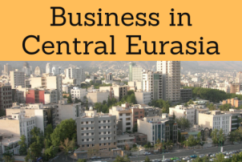
Masters adapted to  Kazakh Students.
Kazakh Students.
Global Trade and Business in Kazakhstan:
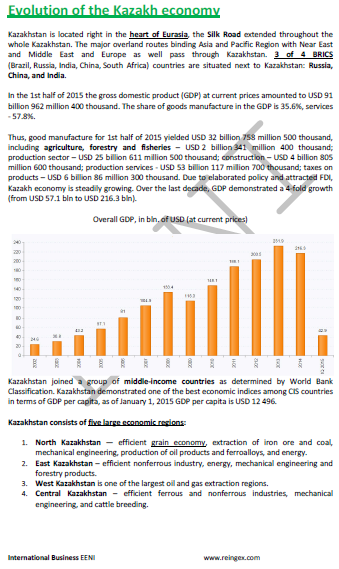
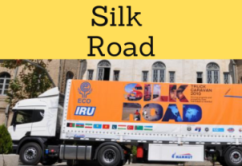
- Almaty-Bishkek Corridor
- Silk Road
- Corridor of the Ashgabat Agreement
- North-South Corridor (India-Russia)
- Europe-Caucasus-Asia Corridor
- China-Central-West Asia Corridor
- Trans-Caspian Corridor
- Access to the:
- China-Pakistan Economic Corridor
- India-Chabahar (Iran)-Afghanistan Economic Corridor
- Trans-Siberian Railway (Russia, Mongolia, China, North Korea)
- Islamabad-Istanbul Corridor
- Kyrgyzstan-Iran Corridor
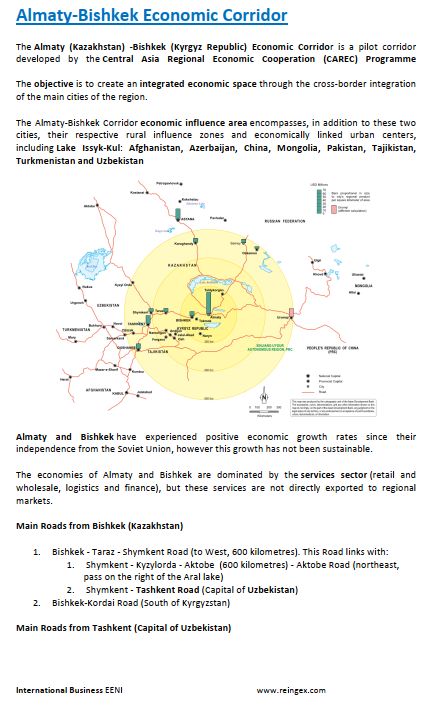

Kazakh Preferential Access and Trade Agreements:
- Kazakhstan and the Central Eurasian Economic Area
- Eurasian Economic Union
- Commonwealth of Independent States
- Economic Cooperation Organization (ECO)
- Shanghai Cooperation Organization
- Central Asia Cooperation (CAREC)
- Belarus-Kazakhstan-Russia-Ukraine Common Economic Space
- Free trade agreement between Russia, Belarus, and Kazakhstan
- Russia-Belarus-Kazakhstan Customs Union
- Eurasian Economic Union (EAEU)-Vietnam Agreement
- Georgia-Kazakhstan Agreement
- Ukraine-Kazakhstan Agreement
- Armenia-Kazakhstan Agreement
- Serbia-Kazakhstan Agreement
- Kyrgyzstan-Kazakhstan Agreement
- Collaboration and Cooperation Agreement with the EU
- Iran-Pakistan-Turkey Transit Transport Framework Agreement (TTFA)
- Cooperation Council of Turkic Speaking States
- Islamic Trade Preferential System

- WTO
- GATS
- Agreement on Sanitary Measures
- Agreement on Technical Barriers to Trade
- Agreement on Preshipment Inspection
- Agreement on Safeguards
- Trade Facilitation Agreement
- WCO
- Convention on the Harmonization of Frontier Controls of Goods
- Organization for Cooperation between Railways (OSJD)
- BIC
- Chicago Convention (ICAO)
- IMO
- Customs Convention on Containers
- Hamburg Rules
- IRU
- TIR Convention
- Guidelines on Safe Load Securing for Road Transport
- Iran-Pakistan-Turkey Transit Transport Framework Agreement (TTFA)
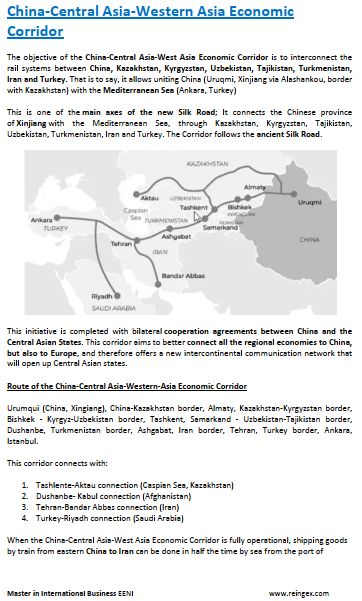
Islamic Organizations. Kazakhstan is a member of...
- OIC
- Islamic Development Bank
- Kazakhstan - Middle East (AMED)
- Arab Development Funds
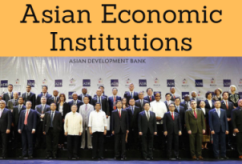
- ESCAP
- Asian Development Bank
- Asia Cooperation Dialogue
- Boao Forum for Asia
- Asia-Europe Meeting

- Kazakhstan is Beneficiary of the European Investment Bank
- UNECE
- Africa-Asia Partnership
- UN
- WB
- WTO
- IMF
Kazakhstan was a member of the Eurasian Economic Community (EurAsEC) - Succeeded by the Eurasian Economic Union (EAEU).
- Kazakh population: 17.6 million people
- 63.6% are Kazakh
- Kazakh Area: 2,724,900 km² (the ninth largest country, two time zones)
- Borders of Kazakhstan: China, Kyrgyzstan, Turkmenistan, and Uzbekistan
- Kazakhstan is a landlocked country
- Official language of Kazakhstan: Kazakh and Russian
- Kazakh Capital: Astana (835,153)
- Largest city of Kazakhstan: Almaty (1,552,349)
- Type of Government: Unitary dominant-party Presidential Republic
- Kazakh Independence: 1991 (URSS)
Main religions in Kazakhstan:
- Sunni Islam (70% of the Kazakh, Hanafi school)
- Orthodox Christianity (26%)

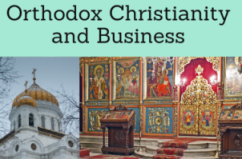
Kazakhstan belongs to the Central Eurasian Economic Area (Islamic Civilization).
- Kazakhstan belongs to the Sunni - Turkic area of the Islamic Civilization
Kazakh Economy.
- Kazakhstan is a Frontier Market
- Petrol and gas areas: 72% of Kazakhstan
- 3% of the total petroleum reserve in the World
- Kazakhstan is a Middle-income country (WB)
- Kazakh GDP: 225.619 billion USD
- Manufacturing: 35% of the GDP
- Services sector: 58% of the GDP
- Kazakh GDP per capita: 12.496 USD
- The main sectors of the Kazakh economy are mining and quarrying (33%), wholesale and trade, manufacturing industry, transportation, building, and agriculture
- Kazakhstan is near to three BRICS Countries (Russia, China, and India)
- EXPO-2017 in Astana
- Ranking in the Ease of Doing Business (WB): 41
- Investor protection
- Kazakh Currency: Tenge
- Kazakhstan is part of the Great Silk Way
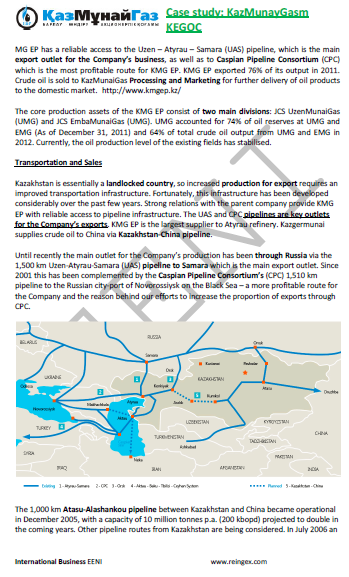
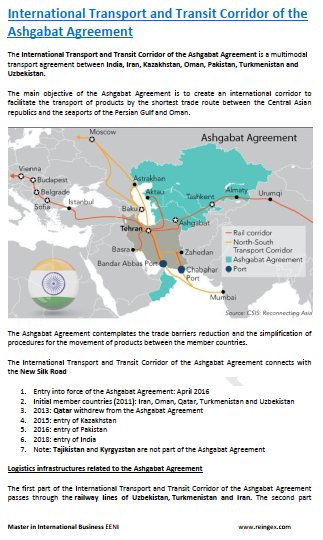

International Trade of Kazakhstan.
- The main Kazakh exports are petroleum, other mineral resources, and raw materials
- The largest Kazakh export markets are Italy, the Netherlands, China, Russia, Switzerland, and France
- The main Kazakh providers are Russia, China, Germany, the U.S., and Italy
- The largest investors in Kazakhstan are the Netherlands, the U.S., Switzerland, China, and France
- Customs union with Russia and Belarus since 2010
- The Common Economic Space (Russia, Belarus, and Kazakhstan) was set-up in 2012
- The Eurasian Economic Union (Kazakhstan, Russia, and Belarus) in 2014
- In 2015, Kazakhstan joined the WTO
- Access to the Eurasian Land Transport Initiative
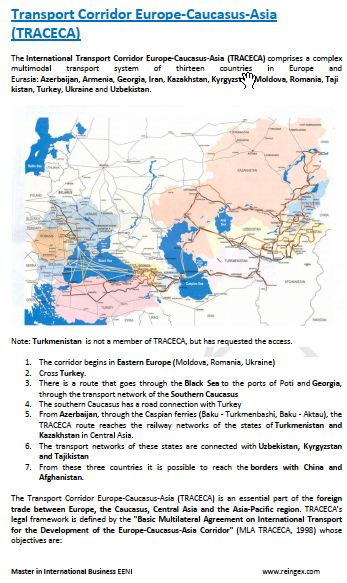
Sample:
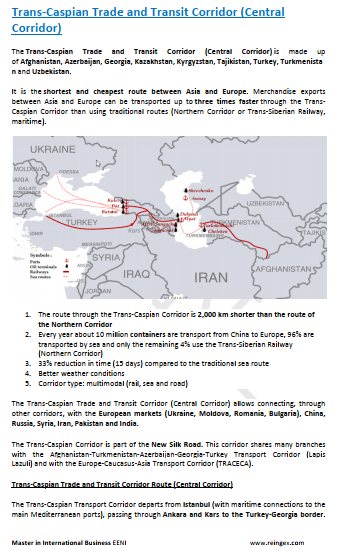
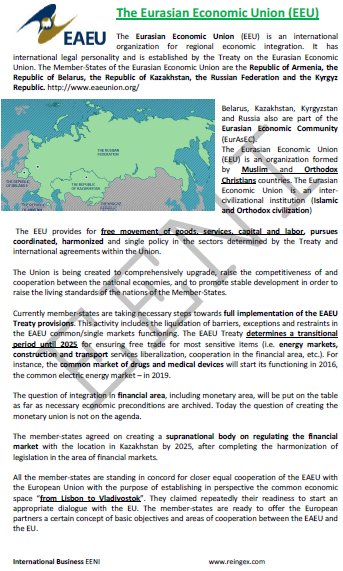
(c) EENI Global Business School (1995-2024)
We do not use cookies
Top of this page



